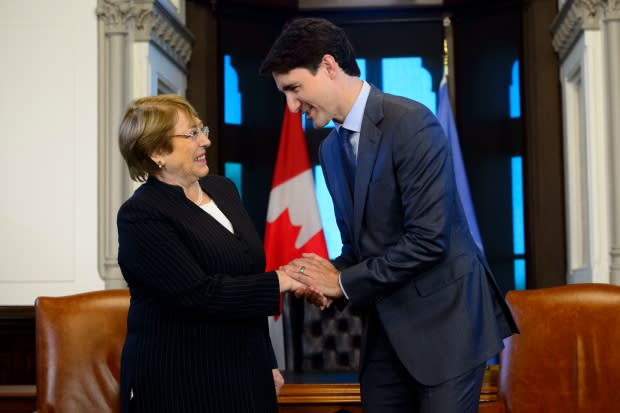'It's time for implementation': UN High Commissioner urges Ottawa to develop national MMIWG action plan
The United Nations High Commissioner for Human Rights is putting pressure on Canada to implement the findings of the National Inquiry into Missing and Murdered Indigenous Women and Girls, which concluded the issue amounts to genocide.
"I think it's very important that Canada will make an action plan. A national action plan to include those recommendations to prevent things from happening again, and on the other hand a plan that includes redress for the victims and the families," High Commissioner Michelle Bachelet told reporters after a series of high-level meetings in Ottawa.
"An inquiry is important, but now I think it's the time for implementation."
A government source told CBC News that Prime Minister Justin Trudeau brought up the issue of missing and murdered Indigenous women and girls in the context of protecting and promoting human rights when he met with Bachelet Monday morning at his office in the West Block of Parliament Hill.
The source also said Trudeau and Bachelet discussed the importance of moving forward and taking meaningful action.

The inquiry's final report makes 231 calls for justice, including the development and implementation of a national action plan to address violence against Indigenous women, girls, and 2SLGBTQQIA (two-spirit, lesbian, gay, bisexual, transgender, queer, questioning, intersex and asexual) people by all levels of government.
The commissioners say the plan should be publicly available and that annual updates should be provided.
They propose the details to be regionally specific, and include devoted funding and timelines for implementation by ensuring basic human rights, such as jobs, housing, education, safety and health care.
Bachelet admitted she had not read the inquiry's final report, but had heard of it.
A spokesperson for Bachelet's office, Ravina Shamdasani, told CBC News earlier that it is calling for Canada's national authorities to assess the serious claims of genocide from the inquiry.
The Organization of American States also wants the federal government to launch an investigation.
'We think we've got a good story to tell'
Minister of Crown-Indigenous Relations Carolyn Bennett said the federal government is taking the UN's reaction seriously.
Bennett's office told CBC News the federal government will have more to say in the coming weeks about its first steps to formally develop a national action plan to address violence against Indigenous women and girls.
"We think we've got a good story to tell in terms of the investments we've made and the concrete actions to stop this national tragedy," Bennett said.
"We said we wouldn't wait for the final report. I think we started investing right in 2016 with housing and water and education, and so I think it's really important that people understand we took this seriously right from the beginning and we will continue to act."

Bennett also responded to concerns raised by former Conservative defence minister Peter MacKay that Canada's bid for a United Nations Security Council seat could be at risk because of the federal government's acceptance of the genocide finding by the inquiry.
"We accept the report and respect the findings, and you know others can debate this for a very long time," Bennett said.
"But we have to get on, and do the work."
During a public panel discussion with Bachelet this afternoon, Foreign Affairs Minister Chrystia Freeland emphasized the importance for Canada to champion human rights by acknowledging domestic issues.
"I think that it makes Canada a more credible defender of human rights around the world when we acknowledge very openly and not defensively that we still have a long way to go at home," she said.
"That opens up a better, truer conversation with other countries."


